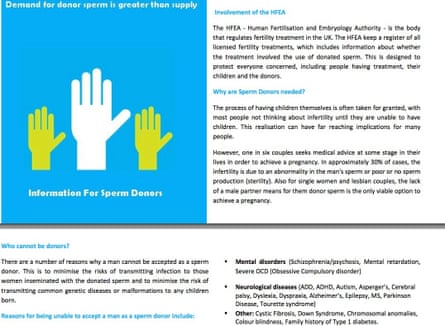Britain’s largest sperm bank has been turning away donors with dyslexia in what it describes as attempts to “minimise the risk of transmitting common genetic diseases or malformations to any children born”.
In a practice branded “eugenics” by campaigners and a would-be donor, the London Sperm Bank has banned men with dyslexia or other common conditions it described as “neurological diseases” from donating.
A leaflet to donors lists a series of conditions the clinic screens for, including: attention deficit disorder (ADD), attention deficit hyperactivity disorder [ADHD], autism, Asperger syndrome, dyslexia and the motor disorder dyspraxia.
The fertility regulator has launched a review of the London Sperm Bank after being alerted to its practices by the Guardian.

Following questions from the Guardian, the Human Fertilisation and Embryology Authority (HFEA) asked the Harley Street-based clinic to explain its literature and policies and is involved in a review of its practices.
In a statement. the authority said: “The HFEA has never required or endorsed prohibiting people with dyslexia, dyspraxia, ADD, ADHD and other disorders from becoming sperm donors. The clinic’s HFEA inspector is clarifying our requirements for selecting donors with the centre, and is reviewing all the exemptions cited in the centre’s materials, to ensure that all future donors are treated fairly and in accordance with the law.”
The intervention highlights a debate among experts about whether dyslexia, which affects up to 10% of the population, should be regarded as a disability.
Some even see dyslexia as an advantage because of the mental attributes often associated with the condition, such as lateral thinking, spatial reasoning and pattern recognition.
Prominent dyslexics have described their condition as a gift, citing the high proportion of dyslexic artists, entrepreneurs and entertainers including Sir Richard Branson, Steve Jobs, Ruby Wax and Benjamin Zephaniah.
Fred Fisher, a 30-year-old dyslexic Oxford graduate, was told of the London Sperm Bank ban when he approached the clinic in November. “I was really taken aback to see dyslexia listed as a neurological disease,” he said. “I’d never thought they would turn people way for having dyslexia, especially given how important we are told science and entrepreneurship are these days.”
Fisher, who is a software engineer based in London, said: “I told them this was eugenics, but it’s not even good eugenics. Would they turn away Richard Branson or Albert Einstein? We need innovative people who think differently in the world. Dyslexic people make a great contribution to our society.
“I would like the government and HFEA to be much clearer about ruling out this practice. And you could say the same for dyspraxia, ADD and ADHD.”
Vanessa Smith, quality manager at the JD Healthcare group, which runs the London Sperm Bank, said: “The HFEA has been in touch with us. In response we will be reviewing all our practices and protocols.”
She said the organisation had now withdrawn its leaflet setting out the ban. Asked whether the London Sperm Bank still regarded dyslexia as a neurological disease, she said: “Our literature states that but the policy is under review. There may be some genetic component to it. But we are going to review all the recent literature about it.”
When Fisher asked why the clinic banned dyslexic donors, he was told this was HFEA policy. Smith said it was “unfortunate” that Fisher was given this “misinformation”.

Steve O’Brien, chair of the Dyslexia Foundation and a board member of the International Dyslexia Association, said: “This is eugenics. It’s trying to say that dyslexics shouldn’t be in society. But we’re moving into a visually dominated world of Instagram and YouTube where given the right tools it is no longer an issue, because people with dyslexia are right-brained often with hyper-visual skills.
“By suggesting you can’t donate sperm because you’re dyslexic will knock people’s confidence. This kind of stuff is what makes people shy away from admitting they have dyslexia and asking for help.”
Smith said: “We definitely don’t work in eugenics. When we recruit a donor what we are looking for is good sperm that is going to freeze well and will produce a pregnancy afterwards. We are looking for someone who is medically clear of infectious diseases and genetic issues that may possibly be passed on to any resulting child. But we are also looking for a guy who is coming forward for the right reasons who understands the lifelong commitment to this.”

Comments (…)
Sign in or create your Guardian account to join the discussion